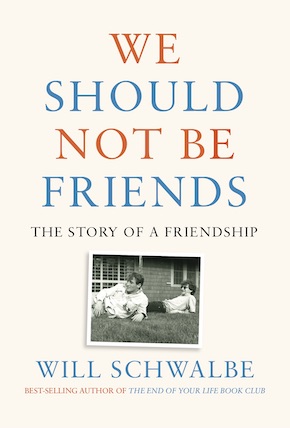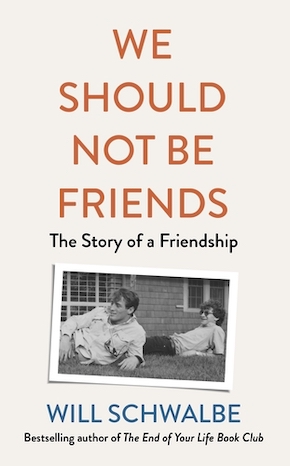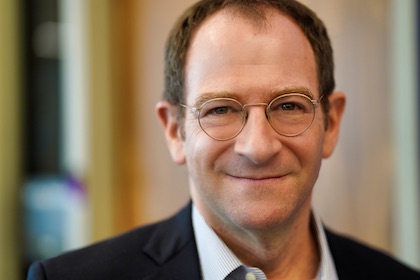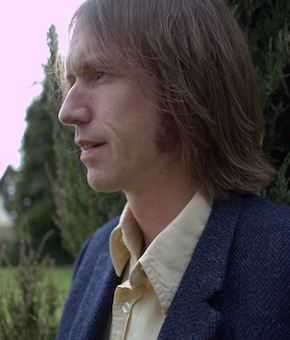‘Love you, man’
by Brett Marie
Will Schwalbe’s multi-decade memoir We Should Not Be Friends kicks off at Yale in the early eighties, when the author is selected for membership in a secret society (no, not that Yale secret society) for his senior year. Looking back at his initiation into the group, Schwalbe describes his impressions of his fellow inductees; one in particular, wrestling-team star Chris Maxey of Berwyn, Pennsylvania, stands out:
“I didn’t know he was a wrestler right away, but he was clearly some kind of athlete. His biceps were so large that he’d cut Vs into his T-shirt so his arms could fit through the sleeves. He had a big grin on his face and was looking around at everyone, taking everything in. The rest of us were pretty quiet, but not Maxey. He shouted hellos to all of us before bounding up to people and introducing himself.”
It’s an inauspicious introduction, to say the least. Schwalbe the classics major observes the gregarious jock Maxey, makes some arm’s-length judgements, and resolves to keep his distance. Of course, there’s nothing quite like shared membership in a secret society to bring two people together. A group retreat and semi-weekly society dinners toss them, along with thirteen other members, into each other’s lives. Schwalbe’s assumptions about Maxey begin to melt away, he grows fascinated by the true character revealed underneath, and if I were to tell you here that this is a love story, you might have an idea where this is all headed. But then, though one of these two men is gay, this isn’t a romance, and though the other is straight, the love in question is far from unrequited.
This is a love story – one of the most satisfying I’ve read in quite some time – but the love on display is of a sort that I don’t encounter in literature very often. A quick scan of my bookcase turns up easily a dozen great and celebrated romances. By contrast, if I’m seeking books about friendship – specifically male friendship – I have to allow Arnold Lobel’s Frog and Toad children’s books and then shoehorn in Peter Gethers’ trilogy about life with his cat Norton just to make a Top Five. Considering that I’ve had many more friends than lovers in my life, the results of my little survey seem positively upside down.
Discussing the book with Schwalbe, I ask if he agrees with my characterisation of his work. His answer is unequivocal: “Yes, I do indeed see it as a love story! I think the love between friends is a very powerful form of love.” But apparently even the author himself didn’t start his project with bromance on his mind. “I originally wanted to write something that was in essence a biography of Maxey. I had come to admire him enormously and I found his life and choices inspiring, so I wanted others to ‘meet’ him through the pages of a book.”
No argument here. Following graduation from Yale, Maxey went on to join the Navy SEALs, and followed that impressive achievement by founding a prestigious and innovative boarding school in the Bahamas. The challenges he’s faced, making the cut with the SEALs and later holding the dream of his Cape Eleuthera Island School together through natural disasters and family crises, are only as formidable as the strength and wisdom he’s summoned to overcome them.
I don’t believe we can be friends with everyone – we need to share values if not opinions. I think the world needs more books about friendships – so I also hope this one inspires readers to write their own.”
Understandably, Schwalbe’s first instinct was to leave the spotlight on this larger-than-life character. “My original plan was for me to be in the book only barely; in a foreword and afterword,” he says. “I proposed this idea to Sonny Mehta and Dan Frank, my publisher and editor at Knopf respectively. Instead of responding to me via my agent, they asked me out for lunch. It was at the end of the lunch that we finally turned the conversation to Maxey and the book. Sonny paused. Sonny was known for his long pauses – and this time he gave an extra-long pause. I said nothing. Then he finally said, ‘I think the book you really want to write is about your friendship.’ And he was right – that was the book I wanted to write and did.”
Mehta’s insight is proven right on every page of We Should Not Be Friends. Maxey takes on an added depth when viewed through the lens of a friend. What’s more, turning a straight biography into a memoir allows Schwalbe to share his own remarkable adventures – taking him from London to Hong Kong to New York, doing his part amid a gay community confronting the AIDS crisis, following his dreams into the fields of journalism and publishing, and even curating a cooking website – which provide a compelling contrast running parallel with Maxey’s. Though the author and his friend often fall out of touch over the book’s four decades, Maxey always finds his way back into Schwalbe’s life, excited to share stories of his work with students and the community around the Island School, eager to share advice, glad to offer a room at his Eleuthera home for Schwalbe to unwind during tough times. Indeed, as strong a character as Maxey is, in body, mind and personality, it’s in his many interactions with Schwalbe over the forty years since the two graduated that his greatest strength – his immense heart – shines brightest.

But Schwalbe’s great admiration for Maxey aside, this is a friendship of opposites, and a true account told from Schwalbe’s point of view must by definition include the author’s honest assessments when he sees his friend as something other than his ideal self. “When we embarked,” Schwalbe tells me, “I told Maxey that he had carte blanche to remove anything from the memoir that he didn’t like or didn’t want in – no questions asked. After he read it, he told me that there were many things I’d written about that he regretted doing and that made him feel ashamed or embarrassed. So I asked him what he wanted me to cut and he said, ‘Not a thing.’ So it’s all there, exactly as I wrote it – no changes from Maxey. He also didn’t express any reservations whatsoever about my observations about him or perceptions of him. When we talk about the past, he’s far more critical of himself than I ever am of him.”
Of course, no one is immune to self-criticism, and one of the book’s most endearing qualities is how, directly and indirectly, Maxey ends up helping Schwalbe work past his own shame and embarrassment on a path to bettering himself. The significance of this sustained act of friendship creeps up on Schwalbe, who describes his distress when Maxey suffers a health scare many years into their relationship:
“I was very worried. I realized that at this point in my life I was panicked by the thought of Maxey vanishing from it. So many times over the decades we had gone years without seeing each other or even talking. How was it that suddenly I was devastated by the thought of losing him?”
His panic gives way to a touching bout of soul-searching:
“I sensed that Maxey held in his mind a picture of me that was better than I really was. I wanted to be that person. I wanted to be a better friend: less judgmental and less afraid. I suspected that the two were closely connected.”
It’s this fear and judgementalism that create in Schwalbe his deep-rooted reserve, a trait to which he often alludes. It takes Schwalbe years to reach this conclusion, to consider the cause of it all (in a passage that makes my heart ache for him), and to recognise the wall his guarded tendencies have been putting up between himself and the people who care about him. “One of the ironies,” Schwalbe tells me, “is that Maxey had no problem for years ending our conversations by telling me he loved me (platonically, of course). But I felt very awkward saying it back to him and was only able to do so recently.” It seems his friend has been doing what friends do, nudging him in the right direction all along.
These are the points of relationship drama in We Should Not Be Friends, and if they seem a bit less intense than a tale of two lovers, this shouldn’t be a strike against it. Passion has its place as a hallmark of many a fine romance. But a lover’s passion is like fire, often destructive, constantly in need of fuel, and (let’s face it) unlikely to burn forever. Furthermore, a classic romance might speak the language of possession (Will the hero get the love interest? Can he hold onto them? If they leave, will he get them back?). But as Schwalbe muses to me, “At its best, the love between friends is a very selfless love – it’s about loving the other person and loving the person you are when you are with them.” What Schwalbe is describing isn’t ‘possession’ at all; I’d call it ‘belonging’ instead. It’s a funny thing about those two words; their meanings aren’t far apart, and yet the difference between them can be vast.
Schwalbe’s previous work, Books for Living, was a celebration of the positive power of literature. In it, he wrote, “Every book changes your life.” I close our conversation by pointing out that an author can’t predict precisely what kind of change their book will make for any given reader. Is there some particular message or lesson in We Should Not Be Friends that he hopes will reach everyone who reads it? He answers: “I really want the book to cause people to reflect on and celebrate their own unusual friendships, especially long-standing ones. I’m looking forward to hearing readers tell me about their friends. And I really want to get across the point that we can be friends with a far broader range of people than we might otherwise have thought. Maxey was prejudiced against me when we met – but I was far more prejudiced against him. And my life would have been far less rich if I hadn’t gotten past that. I don’t believe we can be friends with everyone – we need to share values if not opinions. I think the world needs more books about friendships – so I also hope this one inspires readers to write their own.”
Only time will tell if Schwalbe gets that last wish, but already he’s inspired more than one small piece of writing. Since putting his book down, I’ve sent a flurry of emails – to former neighbours, ex-bandmates, old buddies I haven’t contacted in a long time. Somewhere in each message, I’ve been sure to work in an “I love you.”
—

Will Schwalbe has worked in book publishing (currently as an editor at Macmillan), in digital media and as a journalist, writing for publications including The New York Times and the South China Morning Post. He is the author of Books for Living, The End of Your Life Book Club, and co-author, with David Shipley, of Send. He lives in New York. We Should Not Be Friends is published in the US by Knopf, and forthcoming in the UK from Michael Joseph (30 March).
Read more at Knopf
Read more at Michael Joseph
willschwalbe.com
@WillSch
@AAKnopf
@MichaelJBooks

Brett Marie, also known as Mat Treiber, grew up in Montreal with an American father and a British mother and currently lives in Herefordshire. His short stories and other writing have appeared in publications including The New Plains Review, The Impressment Gang, Pop Matters and Bookanista, where he is a contributing editor. His debut novel The Upsetter Blog is published by Owl Canyon Press.
Read more
@owlcanyonpress
Facebook: Brett Marie
@brettmarie1979
bookanista.com/author/brett-marie/

